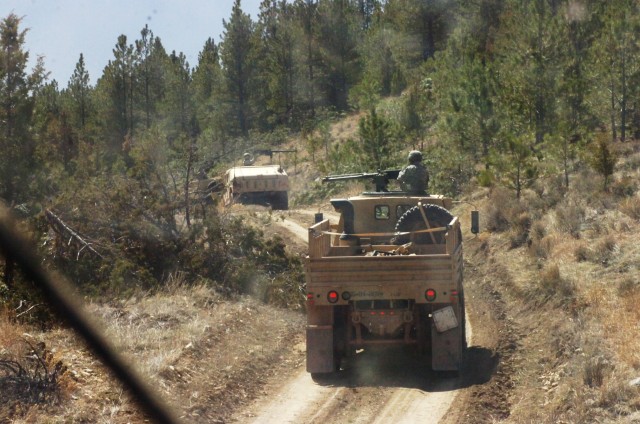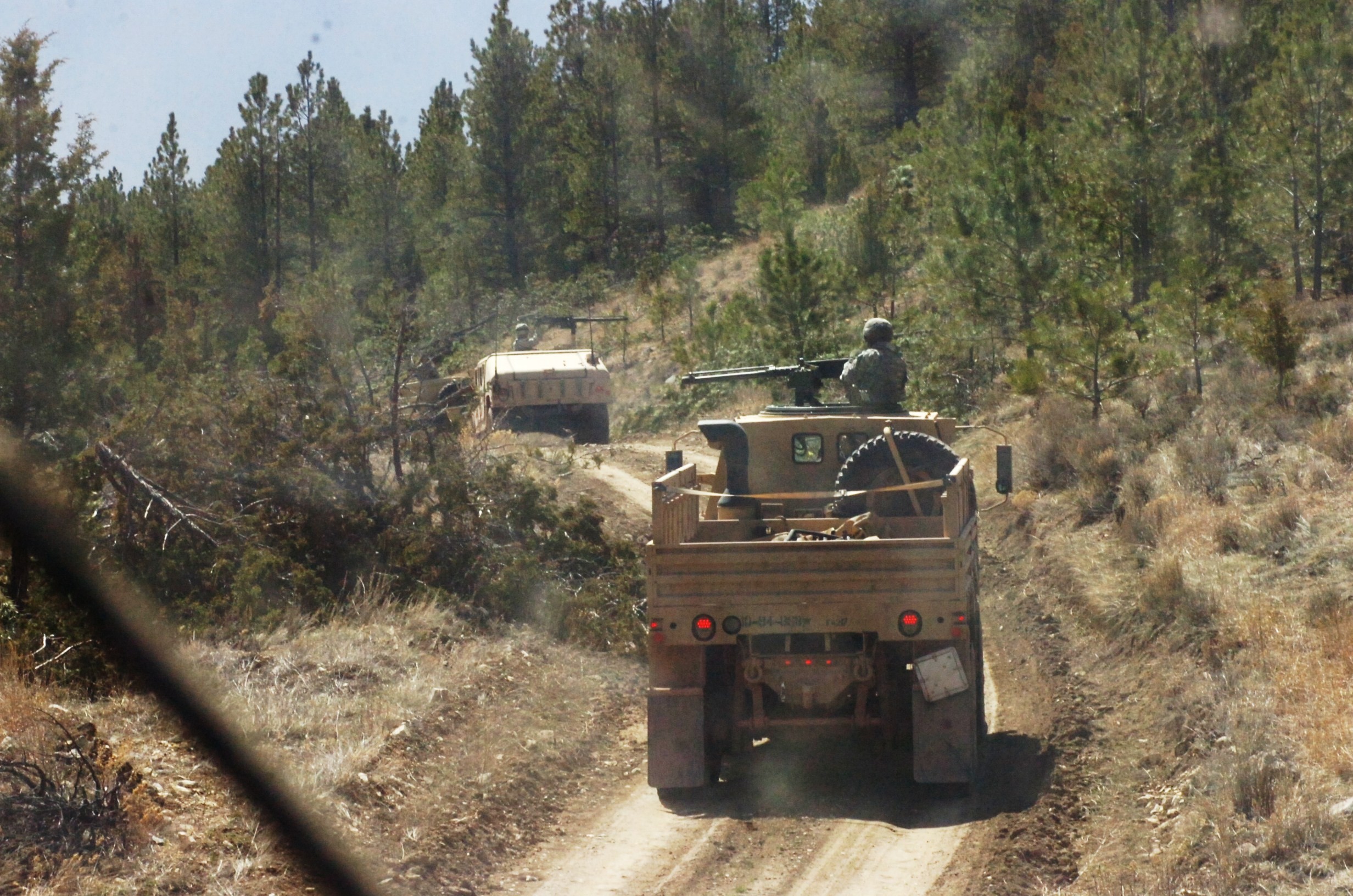CAMP GUERNSEY, Wyo. - Preparing for a deployment, Cavalry Soldiers who transport supplies, maintain equipment and protect leaders practiced defending convoys in an Afghan-like environment using live rounds at Camp Guernsey, Wyo., April 13.
During the training, Soldiers from Distribution Platoon, Troop D, 3rd Squadron, 89th Cavalry Regiment and Troop D maintenance personnel shared a convoy live-fire lane with Personal Security Detachment Soldiers from the squadron's Headquarters and Headquarters Troop. First Lt. Davis George, platoon leader of Distribution Platoon, said the convoy lane's terrain is extremely similar to that of Afghanistan.
The terrain was the most important aspect of the training, because it is a close "facsimile" of what the Soldiers will experience in Afghanistan, said George. Traversing a valley with surrounding mountains enabled the Truck Commanders to scout the mountain tops, looking for snipers and ambushes, he said.
"It gave them a good ... understanding of what they are going to see downrange," said George. "(We were) maneuvering on this one-lane road around sharp curves surrounded by mountains, where we always have to be on the lookout and remain vigilant of our surroundings at all times. You never know when something is going to pop up."
George said the gunners and drivers who went through the training are the same Soldiers that will go downrange to deploy with the unit. Sgt. Michael Molina, a Distribution Platoon squad leader, explained to the Soldiers' their roles in convoy defense before they negotiated the lane. Molina told them success convoys are all about getting back to the basics.
"The importance of (the training) is to get your fundamentals back into it, get positive ID (and) learn to shoot downrange - lay suppressive fire downrange doing the least amount of damage possible with the best, most accurate shots you can," explained Molina. "We try to focus on all our fundamentals and learn how to keep the intervals and the distances between the vehicles as well as maintaining positive communications between the vehicles and the convoy commander."
Soldiers responsible for distributing supplies, such as food, water and ammunition, and who transport personnel are constantly travelling roads, said Molina. He reviewed sectors-of-fire with the gunners before they went down the lane, physically gathering them together - "shoulder to shoulder and back to back" with arms fully extended - to give them a better picture of the 360-degree perimeter they are responsible for protecting.
"We just constantly do what we have to do to get the job done. If you throw anything in front of us, we will succeed," said Molina. "We are one of the many support elements out there throughout the Army that don't like to drop missions." "When you drop a mission ... (it) hinders personnel that you are supporting. If they don't get their supplies, then we are not doing our job; and we have got to get our job done."
George said the overall training at Camp Guernsey is extremely valuable. In fact, leading up to the convoy live fire, Demon Troop Soldiers participated in a rough-terrain driving course that actually came in handy during the convoy lane.
"We drove all throughout north Camp Guernsey. The terrain is pretty rough out there," said George. "It gave my guys awesome experience about traversing through pretty hard, tough terrain; taking those turns, knowing when to speed up and when to slow down, (and learning) what to look out for."
Convoy training and rough-terrain driving are only two positive aspects of training at Camp Guernsey. George listed several other advantages the Wyoming National Guard camp has to offer, some of which are not available at home station however.
George said the various ranges at Camp Guernsey, including known-distance and high-angle, low angle marksmanship rifle ranges, offer opportunities for tremendous training.
"At Fort Polk ... we have ... the flat qualification ranges, the shooting ranges," said George. "That is all well and good for getting your qualification, but out here it is just a valuable, valuable experience that we cannot get back at Fort Polk, unfortunately."
The "Slugger" squadron's movement to Camp Guernsey also allowed 3-89 Cav. to exercise their deployment load-out and shipment procedures for containers, vehicles and personnel. Molina said coming to Wyoming for training helped his Soldiers in another way too. The three-week deployment introduced them to being deployed, being away from home and learning that they have to deal with the same personnel 24 hours a day, seven days a week without ever getting a break from one another, he said.
"Every little thing we have done is getting us prepared for the whole scope of the deployment (to Afghanistan), not just once we hit the ground training but also getting us here and getting us back home," he said George. "I can't emphasize enough how great it is to be out here at Camp Guernsey. Every training effort we have been to is going to do nothing but set us up for success."


Social Sharing